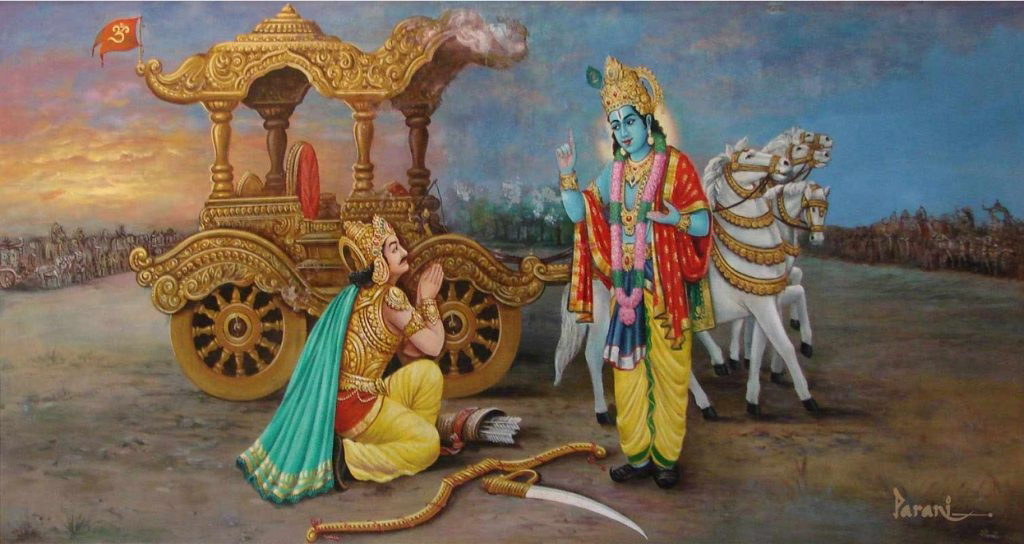The Bhagavad Gita | Chapter 15 : The Ultimate Person
अथ पञ्चदशोஉध्यायः ।
श्रीभगवानुवाच ।
ऊर्ध्वमूलमधःशाखमश्वत्थं प्राहुरव्ययम् ।
छन्दांसि यस्य पर्णानि यस्तं वेद स वेदवित् ॥ 1 ॥
अधश्चोर्ध्वं प्रसृतास्तस्य शाखा गुणप्रवृद्धा विषयप्रवालाः ।
अधश्च मूलान्यनुसन्ततानि कर्मानुबन्धीनि मनुष्यलोके ॥ 2 ॥
न रूपमस्येह तथोपलभ्यते नान्तो न चादिर्न च सम्प्रतिष्ठा ।
अश्वत्थमेनं सुविरूढमूलमसङ्गशस्त्रेण दृढेन छित्त्वा ॥ 3 ॥
ततः पदं तत्परिमार्गितव्यं यस्मिन्गता न निवर्तन्ति भूयः ।
तमेव चाद्यं पुरुषं प्रपद्ये यतः प्रवृत्तिः प्रसृता पुराणी ॥ 4 ॥
निर्मानमोहा जितसङ्गदोषा अध्यात्मनित्या विनिवृत्तकामाः ।
द्वन्द्वैर्विमुक्ताः सुखदुःखसञ्ज्ञैर्गच्छन्त्यमूढाः पदमव्ययं तत् ॥ 5 ॥
न तद्भासयते सूर्यो न शशाङ्को न पावकः ।
यद्गत्वा न निवर्तन्ते तद्धाम परमं मम ॥ 6 ॥
ममैवांशो जीवलोके जीवभूतः सनातनः ।
मनःषष्ठानीन्द्रियाणि प्रकृतिस्थानि कर्षति ॥ 7 ॥
शरीरं यदवाप्नोति यच्चाप्युत्क्रामतीश्वरः ।
गृहीत्वैतानि संयाति वायुर्गन्धानिवाशयात् ॥ 8 ॥
श्रोत्रं चक्षुः स्पर्शनं च रसनं घ्राणमेव च ।
अधिष्ठाय मनश्चायं विषयानुपसेवते ॥ 9 ॥
उत्क्रामन्तं स्थितं वापि भुञ्जानं वा गुणान्वितम् ।
विमूढा नानुपश्यन्ति पश्यन्ति ज्ञानचक्षुषः ॥ 10 ॥
यतन्तो योगिनश्चैनं पश्यन्त्यात्मन्यवस्थितम् ।
यतन्तोஉप्यकृतात्मानो नैनं पश्यन्त्यचेतसः ॥ 11 ॥
यदादित्यगतं तेजो जगद्भासयतेஉखिलम् ।
यच्चन्द्रमसि यच्चाग्नौ तत्तेजो विद्धि मामकम् ॥ 12 ॥
गामाविश्य च भूतानि धारयाम्यहमोजसा ।
पुष्णामि चौषधीः सर्वाः सोमो भूत्वा रसात्मकः ॥ 13 ॥
अहं वैश्वानरो भूत्वा प्राणिनां देहमाश्रितः ।
प्राणापानसमायुक्तः पचाम्यन्नं चतुर्विधम् ॥ 14 ॥
सर्वस्य चाहं हृदि सन्निविष्टो मत्तः स्मृतिर्ज्ञानमपोहनं च ।
वेदैश्च सर्वैरहमेव वेद्यो वेदान्तकृद्वेदविदेव चाहम् ॥ 15 ॥
द्वाविमौ पुरुषौ लोके क्षरश्चाक्षर एव च ।
क्षरः सर्वाणि भूतानि कूटस्थोஉक्षर उच्यते ॥ 16 ॥
उत्तमः पुरुषस्त्वन्यः परमात्मेत्युधाहृतः ।
यो लोकत्रयमाविश्य बिभर्त्यव्यय ईश्वरः ॥ 17 ॥
यस्मात्क्षरमतीतोஉहमक्षरादपि चोत्तमः ।
अतोஉस्मि लोके वेदे च प्रथितः पुरुषोत्तमः ॥ 18 ॥
यो मामेवमसंमूढो जानाति पुरुषोत्तमम् ।
स सर्वविद्भजति मां सर्वभावेन भारत ॥ 19 ॥
इति गुह्यतमं शास्त्रमिदमुक्तं मयानघ ।
एतद्बुद्ध्वा बुद्धिमान्स्यात्कृतकृत्यश्च भारत ॥ 20 ॥
ॐ तत्सदिति श्रीमद्भगवद्गीतासूपनिषत्सु ब्रह्मविद्यायां योगशास्त्रे श्रीकृष्णार्जुनसंवादे
पुरुषोत्तमयोगो नाम पञ्चदशोஉध्यायः ॥15 ॥
Summary
Krishna describes "the realm of sorrow" as a tree, with the branches fed by the gunas and the roots by action. The leaves represent the sacred hymns. Krishna instructs Arjuna to cut this tree down "with the sharp-edged ax of detachment" and search for God, or "the primal Person" that is the essence of the universe. When Krishna inhabits a body, he is not attached to the sensations of it but enjoys them and lets them pass like scents on the wind. People who have self-discipline and follow the path of yoga recognize God in themselves as their Self.
Beings have two different levels of existence, and Krishna explains that "all beings are transient as bodies, / but eternal within the Self." Krishna reveals that the "Ultimate Person" mentioned in the scriptures is actually him. This is secret knowledge he is passing to Arjuna.
Analysis
The term Ultimate Person, which Krishna introduces into his dialogue, is the English translation for the Sanskrit word purusha. Purusha appears throughout important Hindu texts, including the Vedas, to which Krishna often alludes. The important point is that purusha, or "cosmic person" or "Ultimate Person," is also another name for Krishna's ultimate form. This is a significant distinction for those studying the Hindu texts because many distinct terms are used in the conversation about God, Self, and ultimate reality. Terms such as purusha, Brahma (a specific god, but also written as brahma or brahman to refer to the underlying reality of the universe), atman (the Self), and so forth are often used interchangeably or sometimes in similar contexts. To avoid confusion, Krishna states, in this text these terms are all different names for himself.
In verse 8 Krishna gives another explanation of the relationship between God, the Self, and nature/the gunas. This explanation is particularly succinct and helps clarify the relationship. He states that the soul of a person is "one fragment of [himself], becoming / an eternal soul in the world." This indicates that the soul, or Self, of a person is a fragment of Krishna. This soul then "draws to itself the mind / and the other five Nature-born senses." Once this piece of Krishna becomes embodied in the world, it attracts the gunas to itself. When nature and the body surround the Self, a person can become deluded that those things are one and the same.
Application part in human affairs
Chapter 15 of the Bhagavad Gita holds profound significance in the realm of human affairs, offering invaluable insights into the nature of existence, the pursuit of self-realization, and the essence of divinity.
The metaphor of the tree, representing the world with its branches fed by the gunas and roots grounded in action, conveys the interconnectedness of life. The call to cut down this tree with the sharp-edged ax of detachment is an invitation to transcend worldly attachments and seek the primal essence—the Ultimate Person or purusha. This message is a timeless guide for individuals navigating the complexities of existence, urging them to look beyond transient sensations and discover the eternal within the Self.
The revelation that Krishna himself is the Ultimate Person adds layers of depth to the teachings. It unifies various concepts like purusha, Brahma, and atman, clarifying that these are different expressions of the divine reality. This revelation underscores the universality of the Gita's teachings and the interconnectedness of all aspects of existence.
In human affairs, Chapter 15 encourages the practice of self-discipline and the path of yoga, emphasizing the recognition of divinity within oneself. It promotes a profound understanding of the transient nature of the physical body contrasted with the eternal essence of the Self. This chapter, therefore, serves as a guiding light for individuals seeking purpose, clarity, and spiritual fulfillment in the journey of life, offering a timeless roadmap to navigate the complexities of human existence with wisdom and detachment.



Comments
Post a Comment